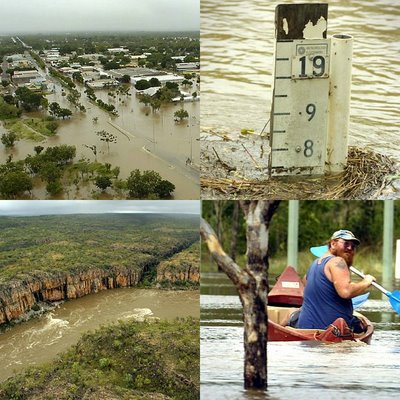Insurers' climate nightmare

By Glenda Korporaal
April 07, 2006
INSURERS have warned that the seachange drift to the nation's tropical north will exacerbate the financial losses caused by global warming.
Climate change was likely to bring more Cyclone Larrys, more severe storms, more frequent flooding and longer droughts to the north of the country, which was becoming home to more and more Australians, IAG chief executive Michael Hawker said.
Mr Hawker, who heads up Australia's largest insurance company, was among a group of six chief executives who released a report yesterday calling on governments to take more action to reduce greenhouse gas emissions.
He said last year had seen a record number of weather catastrophes around the world, such as Hurricane Katrina in New Orleans, and warned that insurance costs in areas affected by cyclones, storms and flooding could rise to the point where people could no longer afford cover.
A report by international reinsurance giant Swiss Re, one of the companies supporting the call for faster action on greenhouse gas emissions, says worldwide losses from natural disasters have risen from $US5 billion in the early 1980s to about $US80 billion last year.
"There has been almost a linear increase in catastrophes occurring since global temperatures started rising in the early 1970s," Mr Hawker said yesterday.
"We have seen the Canberra bushfires, which were the longest bushfires we have ever had; the Melbourne storm a year ago, which was a one-in-100-year event; Cyclone Larry, which was a category-five storm; and the 1999 hail storms in Sydney.
"New Zealand had its worst storms on record two years ago.
"The risks are going up.
"We think you are going to see higher wind speeds, larger hailstones, greater droughts and more storms."
Link Here
Crocodile attacks flood victim
April 07, 2006
A FRESHWATER crocodile has attacked a teenage boy trapped in a tree by flooding at Katherine in the Northern Territory.
The croc bit the 16-year-old boy, one of three boys rescued from the tree, where they had sheltered most of yesterday afternoon.
Police say the teenager was treated for minor lacerations, but did not require further treatment.
The smaller freshwater crocodile is not considered as dangerous as the larger saltwater variety.
"The boys told police they had been stuck in the tree for most of the afternoon yelling for assistance, but to no avail," police said in a statement.
Northern Territory Tactical Response Section officers rescued the three yesterday, ferrying them to safety in an inflatable boat.
Katherine, the NT's third-largest town, remained isolated by floodwaters today.
About 600 people evacuated from their homes yesterday spent the night at one of three shelters at Katherine schools.
Many of them will return to find their homes seriously damaged by floodwaters.
"We have got various houses just north of the Katherine River that are inundated basically to the level of their roof line, which is of concern to those residents," police superintendent James O'Brien said.
The swollen Katherine River has hit 18.97m, and was yet to reach its expected peak of 19.2m, he said.
"The Katherine Gorge has come down to 8.16m, that's come down from 8.91 which was recorded last night," Supt O'Brien said. "That fall is good news for the Katherine residents."
Meanwhile, about 210 residents of the Jilkminggan Aboriginal community, south-east of Katherine, were evacuated last night amid rising floodwaters. They were now sheltering at Mataranka town hall.
"All of those people are in good spirits, they are all safe and well," Supt O'Brien said.




0 Comments:
Post a Comment
<< Home